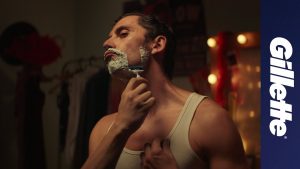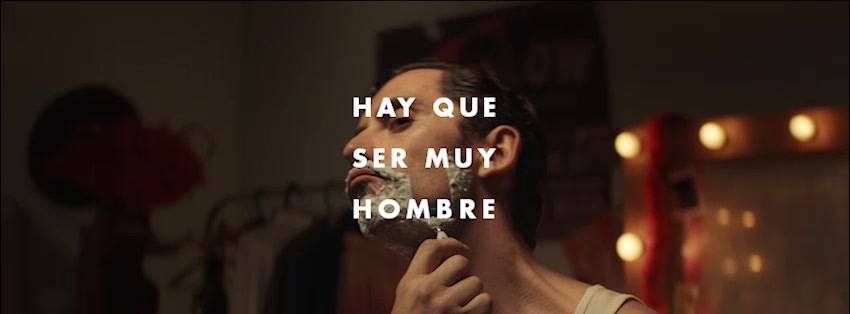The new Gillette Spain campaign by Proximity Madrid has been produced entirely in Spain and is in line with Gillette’s global strategy to target a new, more inclusive and diverse man.
For generations, the idea of “the real man” has forced a dominant male stereotype (with no alternatives) on men, which has interfered with and hindered freedom of expression and behaviour, spreading false ideas about what it means to be a man and reinforcing stereotypes that make men feel uneasy.
Now well into the 21st century, a study has revealed that “75% of Spanish men do not identify with the traditional male stereotype.” This is one of the main findings of the report on masculinity conducted by Salvetti Llombart for Gillette that has been used as the starting point for the campaign.
Eight in ten Spanish men have been hearing about what makes a “real man” throughout their lives, but only one in four identifies with these expectations. What does it mean to be a “real man”? How is a real man supposed to behave? These and other questions are the starting point for “It takes a real man” a study sponsored by Gillette that explores the meaning of masculinity and how it is evolving in Spain. The study reveals that 75% of men do not identify with traditional masculine stereotypes and intend to bring up their children based on a more progressive, positive concept.
“Strength”, “virility”, “courage”, “beard”, “testosterone” and “heterosexuality” are among the terms that Spaniards feel best define men. A total of 68% believe that being born a man is not enough to be ‘masculine’, which is a controversial concept (according to 38%) in conflict with feminism (45%).

The study also reveals how difficult it is to ignore traditional values associated with the concept of masculinity in today’s society, and how social pressure and a fear of being different influence men’s behaviour. So much so, that almost 70% of Spanish men grow up struggling to fit the stereotypes, and 45% acknowledge having experienced pressure to play by the rules to fall within the norms.
Male behavioural models are determined by a series of beliefs passed down from generation to generation. However, the future looks bright. According to the study, men want to change the way they bring up new generations, since they are more aware and want to avoid making the same mistakes. More than 80% of Spanish men intend to change (or are already changing) the way they bring up their children free of these stereotypes and rules of masculinity with which they were educated.
This analysis of Spanish men prompted Gillette to develop a new line of communication that extolled the positive values of masculinity and rejected the negative ones. The result was the ‘It takes a real man’ campaign, based on the Spanish male stereotype.
According to Javier Riaño, head of beauty and corporate marketing at P&G, “brands need to pay attention to issues that affect and concern our consumers. In the case of Gillette, historically linked to men and masculinity, we want to use our voice to launch a modern, positive vision of what it means to be the best version of a man.”
The new campaign features six Spanish celebrities, men who, although famous, also have marvellous stories to tell to inspire young generations with values like integrity, hard work, honesty and respect. Actors Paco León and Jesús Vidal; singer Dani Martín; athletes David Silva and Pau Ribes and photographer and Drag Queen Rubén Errebeene encourage men to bring out the best versions of themselves to become an example and inspiration for future generations.
The campaign consists of a 45-second advert starring the featured celebrities, as well as two, 20-second adverts. The ad begins with a homage to the classic Gillette campaigns, which have starred some iconic personalities over the years, in this case with help from photographer and drag queen Rubén Errebeene. The campaign also includes a series of testimonials where celebrities explain the past and present of what the statement “It takes a real man” has meant to them during their lives. Both the advertisement and the testimonials are hosted on the contents platform along with the manifesto, which explains Gillette’s new positioning and the reason for the campaign.

The homage to the brand’s advertising history also has a graphic element, with several black and white graphics simulating the vintage Gillette style, this time starring the current celebrities. There will also be a social media campaign featuring these personalities with the hashtag #ittakesarealman set to sweep the networks. The campaign was produced by Igloo, directed by Miguel Angulo and the media agency was Carat.
According to Eva Santos, chief creative officer at Proximity Worldwide, “Developing this project with Gillette has been a real privilege. Few brands have the kudos needed to launch a message of this type, which requires both standing and courage, but Gillette Spain has both. Great care has been taken with every detail, from the campaign audio-visual production and graphics to how the concept is addressed, from the discussion phase through to execution, since the project also has educational aspirations. In short, our agency is very proud of this project, which strengthens our commitment to help brands to find these important stories to tell. And if those stories can help to make the world a freer place, all the better.”
In line with this objective, Gillette will fund a programme of interactive chats for teens focused on extolling masculine values. Young people will be able to debate, reflect upon and learn in a secure environment about elementary yet basic things such as that masculinity does not mean having no feelings, with sex or physical things. The ultimate aim of this course is to help young people to overcome the obstacles that stop them from being themselves.
The programme will be devised by sociologists and psychologists and will include collaborations with universities and other institutions related to teenagers. As of September, it will be taught at more than 320 schools throughout the country to around 20,000 young people, boys and girls aged 16 to 18, first and second-year Baccalaureate and Vocational Training students.
Source: Proximity Madrid

You must be logged in to post a comment Login